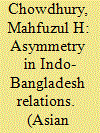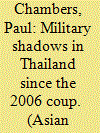|
|
|
Sort Order |
|
|
|
Items / Page
|
|
|
|
|
|
|
| Srl | Item |
| 1 |
ID:
120965


|
|
|
|
|
| Publication |
2013.
|
| Summary/Abstract |
The relation between the two close neighbors in the modern world is bound to be a relation of complex interdependence in normal situation for varied reasons. In South Asia, Bangladesh and India are not only geographically close neighbors, they also share common history, culture, and economic background. India also helped Bangladesh in its war of liberation from Pakistan in 1971, which prompted the liberation of Bangladesh from Pakistani occupation and hastened the emergence of Bangladesh as an independent state. Nethertheless, the relationship between these two neighbors is not symmetrically positive. While the reasons for asymmetry in their relations are manifold, a few of them may be worth mentioning here: history, the larger size of India compared to Bangladesh, the nature of political regimes and their leaders in the two countries, the government policies, geography/border, and the economic conditions in both the countries. This paper, while examining the recent issues that have created problems and the possible areas of cooperation and development in the relations between the two neighbors, suggests that a symmetrical relation of complex interdependence between India and Bangladesh will be beneficial for both the countries in many ways.
|
|
|
|
|
|
|
|
|
|
|
|
|
|
|
|
| 2 |
ID:
120964


|
|
|
|
|
| Publication |
2013.
|
| Summary/Abstract |
In contemporary Thailand, achieving effective civilian control of the armed forces is a daunting challenge. The country's long series of military coups are one outcome of the operational independence generally enjoyed by the military. In most cases, these military interventions have sought to support the political ambitions of the palace and its networks. For almost a decade, Thai politics has been polarized by reactions to the electoral success of former Prime Minister Thaksin Shinawatra and his perceived threat to military and royal power. The military has thus acted as arch-royalist "protector," helping itself to enhance its political status in a monarchy-led parallel state. This paper examines how and why the armed forces continue to remain powerful in Thailand and what prospects exist for diminishing this clout in the messy aftermath of the 2006 coup.
|
|
|
|
|
|
|
|
|
|
|
|
|
|
|
|
| 3 |
ID:
120963


|
|
|
|
|
| Publication |
2013.
|
| Summary/Abstract |
Using unique survey data collected in 2000 and 2010 and a novel approach to the study of women's movement, this study examines the extent to which the women's movement has persisted and/or changed over the past decade in South Korea. The core emphasis of the paper is on whether Korean women's organizations have changed mobilization repertoires that are important for movement formation, and if so, how and why. The findings indicate two things. First, on one hand, the women's organizations have displayed similar patterns of resource mobilization (i.e., financial situation) over a ten-year period. On the other hand, women have used or have been willing to use different political tactics and alliance strategies to pursue their goals. Second, the younger women's groups, compared to their older counterparts, have collaborated more among themselves and have also been more satisfied with other public and private sectors in addressing women's issues and formulating appropriate policies.
|
|
|
|
|
|
|
|
|
|
|
|
|
|
|
|
|
|
|
|
|